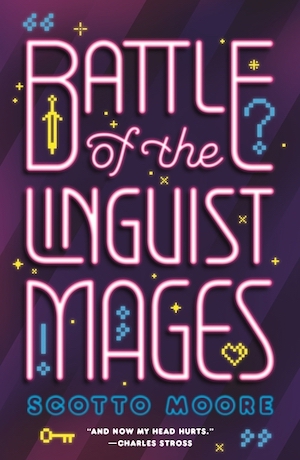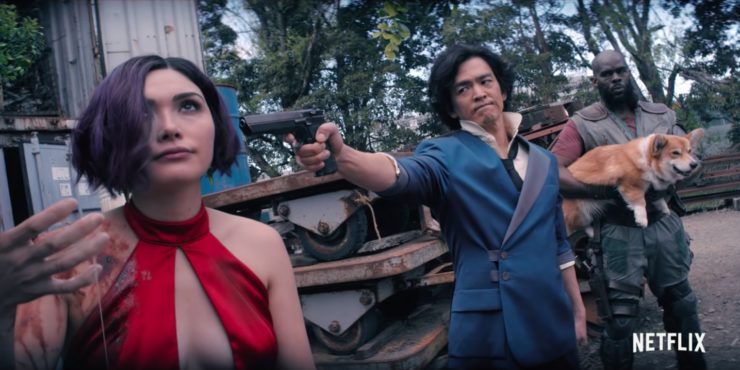The Cowboy Bebop of the 1990s was a delightful show, following Jet and Spike as they bounced from job to job, met Ein, ended up adopting Ein, me Faye, ended up adopting Faye, and finally met Ed, and ended up adopting Ed. The show gave us the adventures of a found family of misfits as they slowly learned to depend on each other. Those adventures were fun, fast-moving, sometimes very violent, and gloried in that decade’s love of mash-up and retro homage. But like fellow ’90s classics The X-Files and Due South, Bebop threaded larger, more serious stories through all the cases of the week and ridiculous banter. Part of why the anime has endured, I think, is that the story of Jet’s old partner, Faye’s pre-cryosleep life, and Spike’s operatic relationships with Vicious and Julia give the hangout episodes a tragic undertone.
Netflix’s update of the show has reconfigured that old balance, sometimes to great effect, but also often to the series’ detriment. Join me for some thoughts and some spoilers!
Let me begin with the good:
John Cho is, no surprise, great. In almost every shot he finds a way to slouch, lean, tilt, sprawl. (It is always a No Bones day for Spike.) There are points when the dialogue is stiff, but he makes it work, and as the series goes along he seems to become looser and funnier.
Jet Black was a bit too much of a change for me at first—rather than being the quiet-but-kind center of the family, he is an anxiety-riddled dad who’s desperate to get back in his daughter’s life, hung up on his ex-wife, and stewing about the life and career he lost seven years earlier. The scripts leave Mustafa Shakir having to pack a lot of knotty, neo-noir twists into only a few episodes. But as with the rest of the show, as it goes along he seems to settle into the role.
Danielle Pineda’s take on Faye worked perfectly for me. She’s over-the-top and hilarious, and seems to have created an often audible running commentary with herself to stay stable.
The actual plotline for Vicious and Julia grew on me. While I loved Faye’s brand of drama, Vicious’ growling and hissing bugged the crap out of me at first, but the more the show gave us of the plot against the Elders of the Syndicate the more it worked, and by the last two episodes I was fully onboard.
Anna and Gren. Anna’s quiet power, her love for Julia, the way she tries to hold her fiefdom while knowing the Syndicate lurks behind her—all great. Gren’s outfits? GREAT. Their clavicle tattoo of GENDER? THE BEST.
Pretty much everything about “Binary Two-Step” and most of “Blue Crow Waltz”.
People turning into trees!
The ridiculous romance between Whitney and the Iron Mink!
Spike battling a bunch of Syndicate goons in the background while Jet watches Kimmie’s recital!
The Jamaican rum called “MonkeyPunchy”!
Some aspects of the reconfiguration of the anime’s arc were, I thought, perfect. I was frustrated by how angsty Jet Black was at the beginning, but by the end of the season his arc of trying so hard to reconnect with his daughter, only to lose her again because of another partner’s betrayal, worked pretty well. I loved the idea that Faye’s memory loss resulted in her basically hitting puberty as an adult. I liked that Whitney was set up as a conniving con artist but turned out to have real affection for her “daughter”.
Finally, the twist ending! (BIG SPOILERS HERE!) I was annoyed by the arc of Julia living through that sort of “gilded cage” life of being the beautiful trophy for a man who becomes increasingly abusive. I also hated the idea that she and Spike fell madly into true love because of one night together. So the idea that in the end she finds a way, finally, to untangle herself from Vicious’ bullshit and install herself in power was a pretty nice payoff. Even better, to me, was that the writers rejected the idea of “Julia the ideal lost love, frozen forever in Spike’s memories” that the anime used so effectively. To have her push back and ask why the hell he didn’t come back for her, and why no one ever bothers to ask what she wants from life, was, frankly, awesome.
What didn’t work for me:
I never fully believed that Jet and Spike had worked together for three years before we meet them. There’s too much expository dialogue, too many things they’re just finding out, too many times when Spike just fucks off and claims it’s for noodles with Jet standing behind him yelling “Spike? Spike!” like a parody of a ‘50s housewife. This eases when Faye shows up, but even then the camaraderie and inside jokes feel more forced than they should between two men who have lived on a small ship and done an incredibly dangerous job together for three years.
The fact that Faye lost her past, but doesn’t have the massive debt to work off as she did in the anime, seems a bit weird. If she doesn’t have that mountain of debt why is she working as a bounty hunter? Is it just because she was found and scammed by Whitney? I also really loved Faye’s debt as one of the most powerful examples of Cowboy Bebop’s critique of a capitalist dystopia, so I was sad to lose it.
To that point, the worldbuilding as a whole felt a little weird. I wanted a sense of how far different worlds actually were from each other. Why does Chalmers seem to show up at every crime scene? How is it safe for Spike to walk into Anna’s at all? I like that Earth is an abandoned shithole in this universe, but I wanted to understand more about the space diaspora, and how exactly certain aesthetics had grown up over time.
The occasional pointless brutality of Vicious, i.e. the gunning down of naked Red Eye factory workers—like sure, it shows us that Vicious is a psychopath, but that scene in particular seemed more about shock value than character development. I would say the same for a few of the confrontations with Julia—I never need to watch another scene of a terrified woman cowering as a man looms over her or chokes her. I get it. I think we all get it.
Buy the Book


Battle of the Linguist Mages
To that point, I think more quiet scenes with Julia just trying to deal with her life—and processing the fact that Spike was alive but never came back for her—would have set up her final decision a lot better. I feel like the writers wanted the shock of her turning on both men, where seeding her decision more throughout the season would have made it even more powerful.
In a general sense, I think the balance was just off. The season needed more time that was a pure fun hangout with Spike, Faye, and Jet, so that the Syndicate plot would have been more of a bloody shock when it came back up. It also would have added to the fear that the found family was at risk. Breaking Jet’s backstory and pursuit of Udai Taxim across a couple of episodes would have made his old partner’s betrayal hit a lot harder when it comes, and added weight to the awful moment when he watches Kimmie run to Chalmers without even a backwards glance. Likewise, I would have the flashback episode appear more in the middle of the series instead of the end. Since the writers made the choice to give Vicious a real storyline, seeing his past with Spike earlier, and understanding his hatred of his father, would have made the strike against the Syndicate more powerful and grounded everything that came in the second half of the season in that shared past.
My other thought along those lines is that a lot of the bounties we meet had good arguments. The ecoterrorists, Hakim, even Pierrot le Fou all had real gripes against the system, trauma, interpersonal issues—I think the show would have felt richer and more balanced if we’d seen more of their points of view early in each of their episodes, rather than learning about them during their fights with the Bebop crew.
In conclusion:
As I watched I was often infuriated by the choices the show made, only to be won back a scene later by something inventive. But in the end, when I saw the full arc the writers were creating, I found myself forgiving some of the clunkier moments and becoming more invested. Overall, yes, obviously, the anime is better, the anime is an all-time classic. But when the show kicks its way out of the anime’s traces it does some interesting stuff, and I’m tentatively in for a Season 2 if they make it.
In case this even needs to be said: Leah Schnelbach would die for Ein. Come jam on Twitter!










